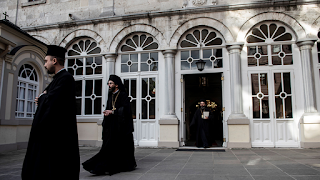
On his visit to the Middle East last January, Vice-President Mike Pence planned to meet with local Christian leaders and to follow up on the promise he had made to suffering Christian communities in Iraq and Syria: “help is on the way.” To his dismay, not a single Christian leader agreed to meet with him. The reason: the Trump administration’s announcement that it would relocate the U.S. embassy in Israel from Tel Aviv to Jerusalem. Samuel Tadros in Mosaic reports on the frequently hostile or ambivalent relationship between Middle Eastern Christians and Jews. (With thanks: Michelle)
Orthodox priests in Istanbul
Few instances in recent memory so starkly illustrate the gulf between American and Middle Eastern Christians as do the enthusiasm for the embassy move expressed by evangelical Christians in the U.S. versus the anger of their coreligionists in Arab lands. Underlying this difference in attitudes toward the Jewish state, moreover, are fundamentally different attitudes toward Jews themselves.
The major shifts that took place in Western churches’ relationship with Judaism—some in the wake of the Holocaust, others going all the way back to the Protestant Reformation—never occurred in the Eastern churches. Middle Eastern clergy do not speak of a “Judeo-Christian” tradition, or of a special relationship with the Jews, or even of a need to distance themselves and their flocks from historical anti-Semitism. Thus, the latest manifestation of Jewish-Christian harmony—Pope Francis’s 2013 Evangelii gaudium, in which he wrote that “the Church believes that Judaism, the faithful response of the Jewish people to God’s irrevocable covenant, is salvific for them, because God is faithful to His promises”—is simply unimaginable in the East. Even less imaginable are the motives and convictions that have led so many American evangelicals to support Israel.
For the most part, Middle Eastern Christianity has firmly rejected Nostra aetate, the Second Vatican Council’s declaration condemning anti-Semitism and exculpating the Jewish people of collective responsibility for the crucifixion of Jesus. Instead, anti-Semitic conspiracy theories, rife today in the Islamic world, find fertile ground among Middle Eastern Christians as well. Over recent years, an Egyptian Coptic priest could write of the dangers allegedly posed to his church by Jews and Zionist-controlled Freemasons; the bishop of the Syriac Orthodox Church in Lebanon, citing as evidence the Protocols of the Elders of Zion, could blame the Jews for the civil wars and violence sweeping the Arab world; and the Melkite Greek Catholic patriarch in Iraq could trace a deadly 2003 terrorist attack to “a Zionist conspiracy against Islam.”
Conventional wisdom holds that behind such attitudes there lies the Arab-Israeli conflict—either because Middle Eastern Christians see themselves as Arabs and therefore will automatically side against Israel and the Jews or because, as a vulnerable religious minority, they fear provoking the animosity of their anti-Israel and frequently anti-Semitic Muslim overlords. But these explanations, while telling part of the story, by no means tell all of it. Not only are there deeper historical and theological factors at play, but attitudes toward Jews and Israel are at once more intricate and more contradictory than they might appear at first glance.
Any examination of this topic is complicated by the multicolored mosaic that is Middle Eastern Christianity. While the Roman Catholic Church and various Protestant denominations do have a presence in the Middle East, most Christians in the region belong to one of the dozens of Orthodox native churches that broke off from European Christianity as a result of theological debates in the 5th century or the Great East-West Schism of 1054.
Broadly speaking, we can discern three major groupings. The Oriental Orthodox churches—an example is the Coptic church that predominates in Egypt—are in communion with each other but not with the major European churches. Then come the Eastern Orthodox churches of Alexandria, Antioch, and Jerusalem. Finally, and smallest in number, there are the Eastern Catholic churches, of which the most important is the Maronite church in Lebanon.
Nor do the native churches break down neatly along geographical lines. Syrian Christians are divided between the Eastern Orthodox churches and the Oriental Syriac Church, while most Iraqi Christians are either Catholic Chaldeans or Assyrians. Notably, Maronite, Coptic, and Assyrian Christians don’t consider themselves Arabs, even if Arabic is their primary language, in contrast to many Syrian, Israeli, and Palestinian Christians who do so identify themselves.

Leave a Reply